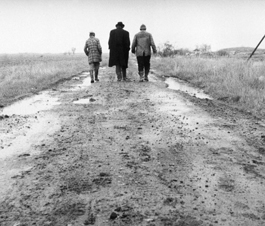home | metro silicon valley index | movies | current reviews | dvd review

Photograph by Jerome Prebois
RUSTICATED: The trapped souls of 'Sátátangó' live in a ramshackle, collapsing rural hamlet.
Animal Farm
Béla Tarr's epic 'Sátántangó' arrives on DVD
By Richard von Busack
IT HAS been said that there are greater movies than Citizen Kane but none that are both great and quite so accessible. Of Sátántangó, Hungarian director Béla Tarr's 1994 epic, now available on DVD, it can be said that there are greater movies but none quite so great and rebarbative. Around the two-hour (with 5 1/2 hours to go) point comes Sátántangó's most infamous sequence (so consider yourself warned). A little girl, who looks like Alfred E. Neuman in a grubby pinafore, roughhouses with a tabby for more than 10 minutes, then suspends it in a net and finally force-feeds it rat poison dissolved in milk. Happily the poisoning looks fake, as opposed to the on-camera strychnining of a puss in the Hungarian film Hukkle. This sequence does illustrate Tarr's point about the abuse of power in a vacuum. I can't watch it, but I also can't argue with its artistic inclusion as illustrating a hamlet being swallowed up by the earth and the kind of misrule that requires you to kiss the whip before the flogging begins.Sátántangó's brilliantly textured black-and-white surfaces could be summed up by that line in Monty Python and the Holy Grail: "Dennis, there's some lovely filth down here." Before the end of Communism, a rain-soaked, run-down collective farm in Hungary is down to about a half-dozen workers. A huge vegetating doctor (Peter Berling, who has the operatic bulk of Orson Welles in his last roles) keeps dossiers on them. Meanwhile, he drinks himself to death on some clear, oily liquor. The doctor's long, long stagger toward a lit-up pub glowing in a downpour—the building swaying a little like a fata morgana—is one of the most exquisite images of the alcoholic life I've ever seen in a movie.
As the doctor leaves the movie, the schemer Irimiás (Mihály Vig) enters: he's the first really good-looking character in the film after four hours and thus is absolutely not to be trusted. I have to qualify that one Mrs. Schmidt (Éva Almássy Albert), an unfaithful wife, is attractive enough: she has a fascinating face, half Björk, half Brezhnev. The local yokels try to grab her mountainous boobs during the film's dance sequence, set to a 20-minute loop of an accordion two-step guaranteed to make you blubber out a confession. She has sensitivity, though. In an ordinary film, Mrs. Schmidt would have been the one who smelled trouble over the sulfurous stink of the cheap coal in the tavern's stove and the poisoned mud of the farmyard.
Because of the flatness of his settings, Tarr has the advantage that makers of Westerns enjoy: he can watch these figures during their epic mud trudges until they fade out 1,000 yards away. Also powerful is Tarr's luxurious use of time. If any film is worthy of being double-billed with Sátántangó, it would be Erich von Stroheim's original 10-hour version of Greed, available only in some film archive in the Next World. This DVD set includes Tarr's Macbeth, made for Hungarian TV, and his brilliant four-minute, 33-second Prelude, a short that takes in the enormous length of a Hungarian breadline. To quote the same Dennis who is addressed above, "Now we see the violence inherent in the system."
SÁTÁNTANGÓ; four discs; Facets Video; $79.95
Click Here to Talk About Movies at Metro's New Blog
Send a letter to the editor about this story.
|
|
|
|
|
|